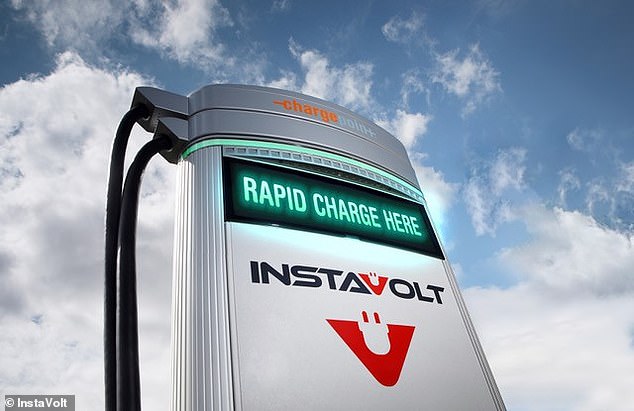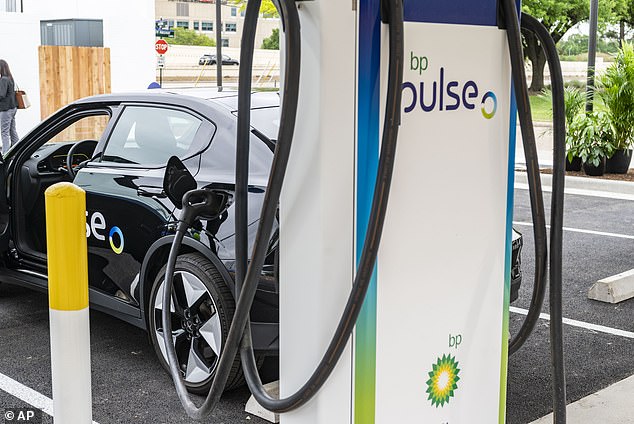Thieves are targeting EV charging cables at fast-charging locations during the latest wave of car-related crime
The electric vehicle charging industry is the latest target of car crime, with cable thefts on the rise.
Experts warn thieves are going after the copper in cables at fast and ultra-fast charger locations, in a crime wave dating back to November.
Autocar says Instavolt, Britain’s largest fast charger operator with Osprey Charging and BP Pulse, has since had 174 cables stolen from 27 locations.
Instavolt, Britain’s largest provider of fast chargers, has reported that 174 EV charging cables have been stolen from 27 locations since November in the latest wave of car-related crime in Britain.
Residents of Nottinghamshire first reported the problem of missing charging cables at The Malting Retail Park, Northgate and at Waitrose, Ossington Way in November – around seven months after four high-powered Osprey EV chargers were first installed in Northgate.
With this type of charger, the cable is attached to the charging point, which the EV owner plugs into their car to charge it.
At the time, ZapMap showed that EV charging points at Albert Street and Appletongate – both owned by BP Pulse – were also offline.
An Osprey spokesperson confirmed that Osprey was ‘aware of co-ordinated vandalism targeting public charging points in the Leeds, Newark, Rotherham and Derby areas’ and said it was working with police and other operators to share CCTV footage.

The intended type of charging cable is connected to fast or ultra-fast chargers, which are usually found at highway gas stations, retail parks and large locations.
Instavolt has more than 1,500 active chargers in the UK, bringing the 174 affected locations reported by Autocar to just under 12 (11.6). percent of the network.
Each cable cut will cost providers between £700 and £1,000 – an expensive problem, but Instavolt is most concerned about how this could damage public trust.
Delvin Lane, CEO of Instavolt, told Autocar: “These thefts are extremely frustrating for our customers and for us.
‘The EV revolution is already underway, with more than a million EVs on the road (in Britain).
“Our mission is to make EV charging as easy as possible, and reliability is one of our core values.”
The government recently introduced a new reliability requirement that requires charging point operators to ensure that their network of fast charging points is active for at least 99 percent of each calendar period on average.
Why are cables cut?
It appears that organized gangs of thieves are cutting charging cables to strip the copper wiring inside and selling them to illegal scrap dealers, or on places like Facebook Marketplace and eBay.
In March, copper hit an 11-month high, with prices on the London Metal Exchange rising to $9,164.50 per tonne.
The International Copper Study Group predicts that global copper demand will increase by 4.6 percent in 2024 due to demand for renewable energy systems and the expansion of the electric vehicle fleet, combined with global supply constraints.

Thieves cut the cables to strip them and sell the copper wiring to illegal scrap dealers or on Facebook Marketplace and eBay
But while the price of copper may be tempting, the cable wiring isn’t worth as much as vandals might imagine.
Lane told Autocar ‘that the cable is not a solid copper rod, but just pieces of thin wire that take ages to pull out. It is a misconception that it actually provides copper with financial gain.”
A recent CBN News report looked at charging cable theft in Canada and found that EV chargers only contain about $5 worth of copper metal – that’s about £3.93.
For the 174 reported Instavolt thefts, vandals have collected less than £700, which considering the effort it takes to cut and steal the cables – Lane says vandals will keep coming back to the same location to strike again – isn’t really is a reward.

BP Pulse has also been affected, as have Gridserve and Osprey. While there are no direct costs to EV drivers, “the thefts only cause inconvenience to EV drivers – including those in emergency services – who want to charge their vehicles,” Lane says.
Which devices are affected?
In 2022, This is Money reported that there was a spike in cases of EV drivers’ charging cables becoming pinched, while at the same time there was a wave of catalytic converter thefts across the country.
Standard AC cables for slow charging at a wallbox or public charging point are worth approximately €200 if stolen.
But the current wave of cable thefts is now hitting charging companies with fast and ultra-fast chargers typically found at gas stations and highway retail parks.
As of April 1, 2024, the Department for Transport and ZapMap confirmed that there are 61,232 EV charging devices in the UK: 22,924 of these are the 50 kW and over chargers that thieves are currently targeting.
While there are no direct costs to EV drivers, “the thefts only cause inconvenience to EV drivers – including those in emergency services – who want to charge their vehicles,” Lane says.
Charging security improvements
Instavolt has introduced robust measures at its charging locations across the country to deter further damage, including security patrols, installing additional CCTV cameras at each location and using Smartwarter tags on the cable to deter thieves and track devices.
Lane said: “We are taking this very seriously and are involved with policing at all levels. We call on the sector to come together and use the full force of the law. It is not only the thieves we are looking for, but also the scrap dealers who handle this stolen product.
“We hope the devices will take us directly to the scrap dealers who handle the cables.”

Charging point providers have taken additional security measures, including installing more CCTV cameras, organizing security patrols and smartly tagging the cables to track them
Osprey also added extra CCTV and tagging security when its chargers were stolen in 2023.
A spokesperson confirmed at the time: ‘Osprey is improving its security measures at all locations in these regions, installing additional CCTV and labeling and marking cables so they can be traced by police.
‘The team continues to work closely with police to support the monitoring and prevention of further vandalism against public EV charging points in these areas.’
Gridserve has also been a victim of the crime, with a spokesperson confirming to Autocar that it is investigating ‘additional anti-theft measures’.
Instavolt says the sector needs ‘swift law enforcement against the criminals disrupting EV drivers’, while ChargeUK – the trade body for the charger industry – told Autocar it is working with the Home Office and a new dedicated police unit to tackle to solve problem.
This is Money has contacted Instavolt, Gridserve and BP Pulse for additional comment.
Some links in this article may be affiliate links. If you click on it, we may earn a small commission. That helps us fund This Is Money and keep it free to use. We do not write articles to promote products. We do not allow a commercial relationship to compromise our editorial independence.
